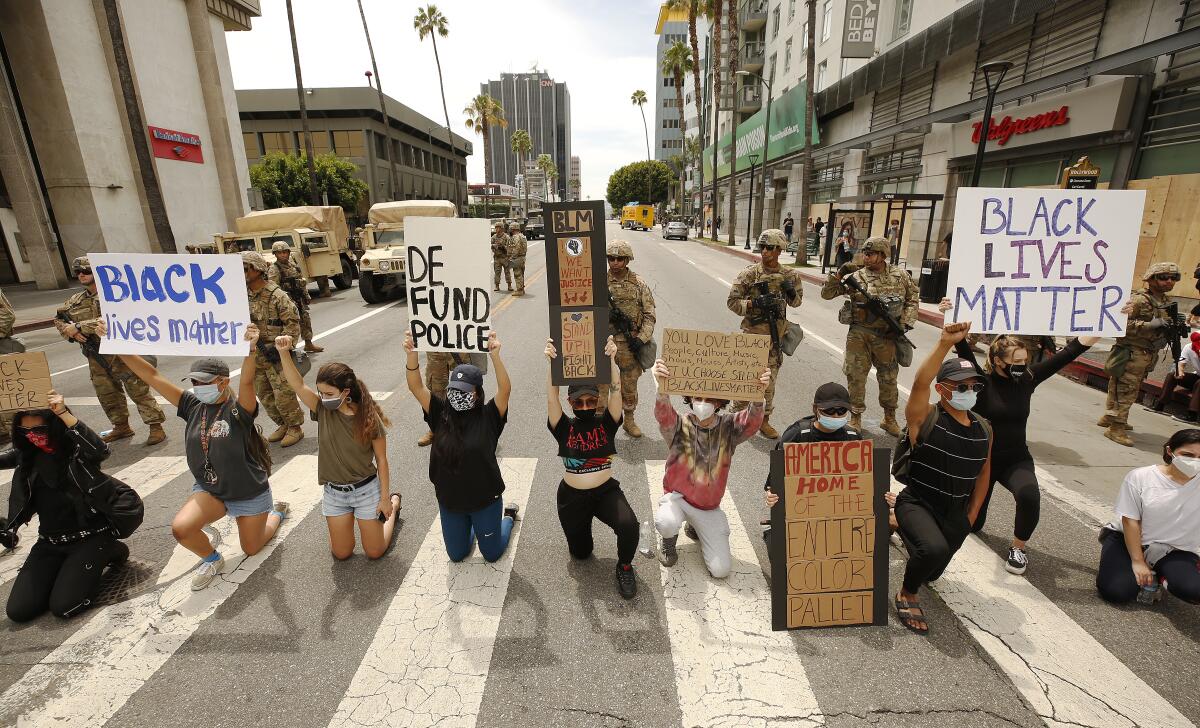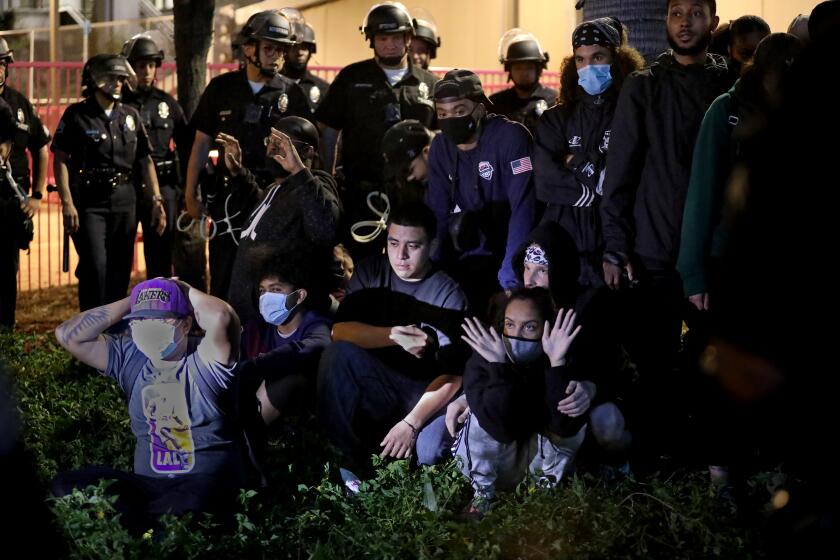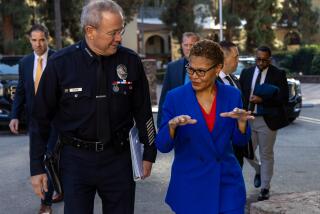Editorial: Defund the LAPD? It’s time to rethink public safety in Los Angeles

- Share via
The George Floyd protests on the streets of Los Angeles have caused a seismic shift inside City Hall — and the time is right.
For decades, there’s been a constant push to increase the size and scope of the Los Angeles Police Department. Mayors from Republican Richard Riordan to Democrat Eric Garcetti have sought to expand the force to 10,000 officers, while also resisting proposals to shrink the police budget even during the depths of recession.
Just a few weeks ago, with the city’s finances in a coronavirus-induced free fall, progressive activists pleaded with city leaders to rethink police funding. Still, Garcetti and the City Council plowed ahead with plans to increase the police budget by 7% and give officers generous pay raises while slashing funding for parks, housing and economic development services for the city’s most vulnerable residents.

Nationwide, protesters and activists have been calling to “defund the police.” But what does it actually mean? And why are so many people calling for it to happen?
Then Floyd died under the knee of Minneapolis Police Officer Derek Chauvin. Protests quickly spread across the country. In Los Angeles, thousands of people of all races and ethnicities crowded the streets to demand justice and police reform. They stood outside the mayor’s official residence in tony Windsor Square chanting, “Defund the police.”
Their voices were heard. City Council President Nury Martinez and her colleagues proposed reducing the LAPD budget by as much as $150 million — a cut of up to 8% — in the coming fiscal year. Garcetti agreed to redirect $250 million from the Police Department and other city programs to pay for jobs for youths, health initiatives and “peace centers” to heal trauma in the black community.
It’s hard to tell if L.A. leaders consider this a one-time cut to the police budget to answer protesters or the beginning of a larger rethinking of the mission and scope of the LAPD.
It should be the latter.
The Times Editorial Board has consistently backed the expansion of the LAPD as a way to rid the department of its occupying force mentality. This was based on years of watching an understaffed and overstressed department, steeped in an insular us-versus-them culture, engage in brutal and oppressive policing. We still have that concern. And it would be a mistake to slash the LAPD budget so deeply that it becomes impossible to continue successful initiatives like the Community Safety Partnership, which has been a model for reducing crime and building community trust in police.
But it’s also clear that the decades-long effort to remake the LAPD has come at a steep price. The Police Department consumes more than half of the city’s “unrestricted funds,” which are tax revenues, fees and fines that can be spent however city leaders wish. Protecting Police Department funding now would require heavier cuts in services and programs that could be used address the root causes of crime, including poverty, joblessness and lack of opportunity.
The LAPD budget has grown 58% over the last decade even as crime has fallen dramatically. The homicide rate in 2019 was the lowest since 1962. In January, Chief Michel Moore declared this was “one of the safest times in Los Angeles.”
To activists and budget hawks, that’s all the more reason to cut spending on the LAPD and reset the mission. They argue that the department is too big, too militaristic and too ever-present in communities of color. Residents in those neighborhoods are more likely to be stopped by police, which puts them at a greater risk of a citation, an arrest or a deadly confrontation. In a “People’s Budget” offered earlier this year, advocates with Black Lives Matter and other grass-roots groups called for a 90% cut in LAPD funding, with the money redirected to housing, health, transportation and community services.
That’s extreme, but the groups are right to challenge the status quo. The city relies too much on the Police Department. Officers direct traffic. They check fares on Metro subways. They’re sent to do welfare checks on the homeless and people experiencing a mental health episode. Do we need law enforcement officers doing those jobs? Or could the work be better done by civilian specialists?
The protests have rightly put the spotlight on policing. But reform should go deeper than simply cutting the LAPD budget this year, or paying for more officer training and body cameras. Although there’s nothing more important than public safety to a community’s well-being and prosperity, for too long the city’s leaders have treated the LAPD as the answer to all public safety problems. It’s time to rethink how we can make the city safer for all its residents.
To protect the gains already made, protesters must follow up with action at the ballot box.
More to Read
A cure for the common opinion
Get thought-provoking perspectives with our weekly newsletter.
You may occasionally receive promotional content from the Los Angeles Times.











